
Article
Granzyme A Produced by γ9δ2 T Cells Induces Human Macrophages to Inhibit Growth of an Intracellular Pathogen
PLOS Pathogens
(2013)
Abstract
Human γ(9)δ(2) T cells potently inhibit pathogenic microbes, including intracellular mycobacteria, but the key inhibitory mechanism(s) involved have not been identified. We report a novel mechanism involving the inhibition of intracellular mycobacteria by soluble granzyme A. γ(9)δ(2) T cells produced soluble factors that could pass through 0.45 µm membranes and inhibit intracellular mycobacteria in human monocytes cultured below transwell inserts. Neutralization of TNF-α in co-cultures of infected monocytes and γ(9)δ(2) T cells prevented inhibition, suggesting that TNF-α was the critical inhibitory factor produced by γ(9)δ(2) T cells. However, only siRNA- mediated knockdown of TNF-α in infected monocytes, but not in γ(9)δ(2) T cells, prevented mycobacterial growth inhibition. Investigations of other soluble factors produced by γ(9)δ(2) T cells identified a highly significant correlation between the levels of granzyme A produced and intracellular mycobacterial growth inhibition. Furthermore, purified granzyme A alone induced inhibition of intracellular mycobacteria, while knockdown of granzyme A in γ(9)δ(2) T cell clones blocked their inhibitory effects. The inhibitory mechanism was independent of autophagy, apoptosis, nitric oxide production, type I interferons, Fas/FasL and perforin. These results demonstrate a novel microbial defense mechanism involving granzyme A-mediated triggering of TNF-α production by monocytes leading to intracellular mycobacterial growth suppression. This pathway may provide a protective mechanism relevant for the development of new vaccines and/or immunotherapies for macrophage-resident chronic microbial infections.
Disciplines
- Biology and
- Cell Biology
Publication Date
January 10, 2013
DOI
10.1371/JOURNAL.PPAT.1003119
Citation Information
Spencer CT, Abate G, Sakala IG, Xia M, Truscott SM, Eickhoff CS, Linn R, Blazevic A, Metkar SS, Peng G, Froelich CJ, Hoft DF. Granzyme A produced by γ(9)δ(2) T cells induces human macrophages to inhibit growth of an intracellular pathogen. PLoS Pathog. 2013 Jan;9(1):e1003119. doi: 10.1371/journal.ppat.1003119. Epub 2013 Jan 10. PMID: 23326234; PMCID: PMC3542113.
